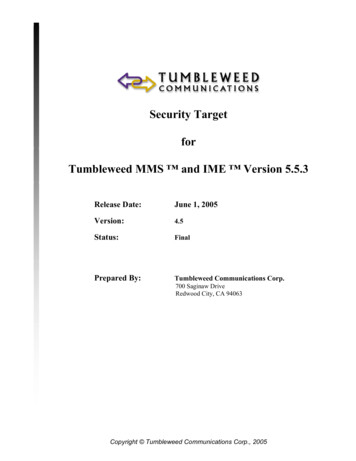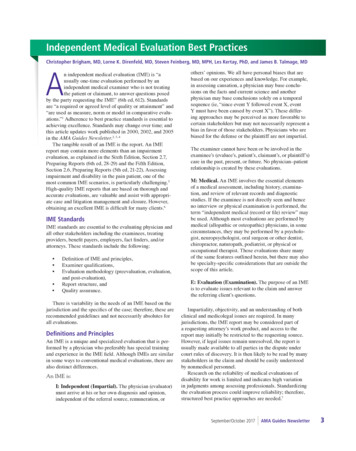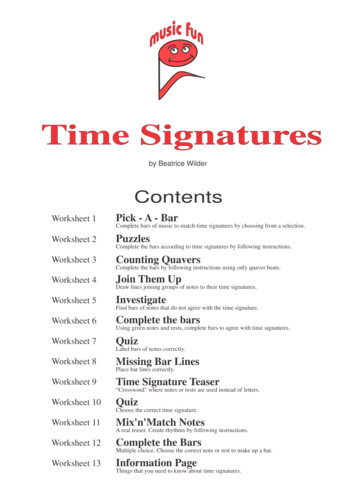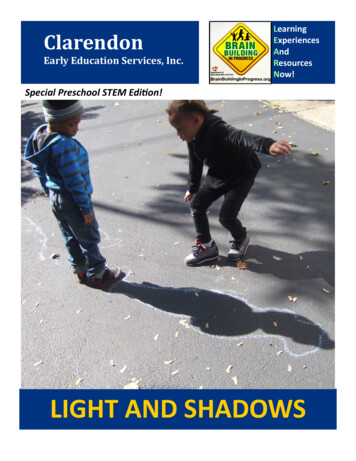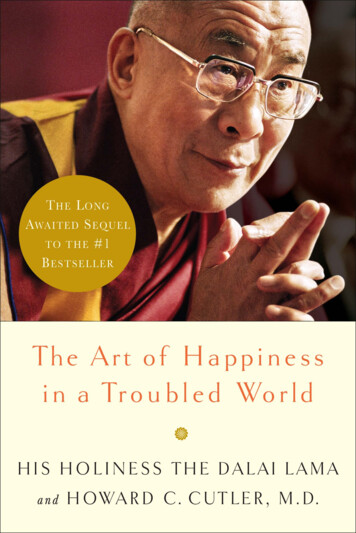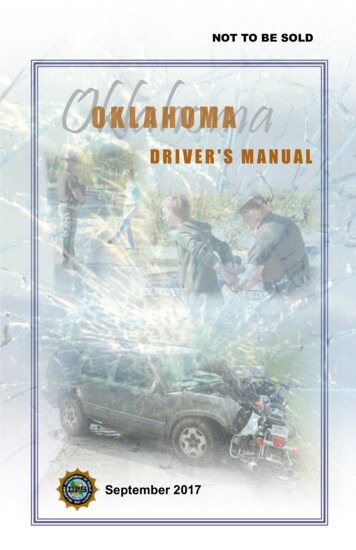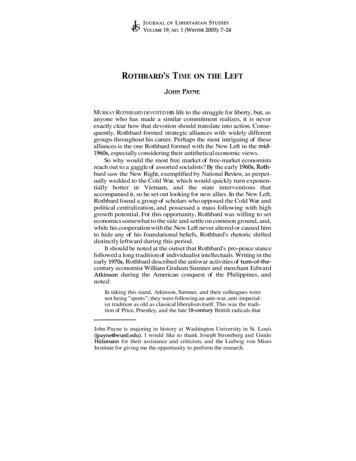
Transcription
ROTHBARD'S T IME ON THE LEFTMURRAY ROTHBARD DEVOTED HIS life to the struggle for liberty, but, asanyone who has made a similar commitment realizes, it is neverexactly clear how that devotion should translate into action. Consequently, Rothbard formed strategic alliances with widely differentgroups throughout his career. Perhaps the most intriguing of thesealliances is the one Rothbard formed with the New Left in the rnid1960s, especially considering their antithetical economic views.So why would the most free market of free-market economistsreach out to a gaggle of assorted socialists? By the early 1960s, Rothbard saw the New Right, exemplified by National Review, as perpetually wedded to the Cold War, which would quickly turn exponentially hotter in Vietnam, and the state interventions thataccompanied it, so he set out looking for new allies. In the New Left,Rothbard found a group of scholars who opposed the Cold War andpolitical centralization, and possessed a mass following with highgrowth potential. For this opportunity, Rothbard was willing to seteconomics somewhat to the side and settle on common ground, and,while his cooperation with the New Left never altered or caused himto hide any of his foundational beliefs, Rothbard's rhetoric shifteddistinctly leftward during this period.It should be noted at the outset that Rothbard's pro-peace stancefollowed a long tradition of individualist intellectuals. Writing in theearly 1970s, Rothbard described the antiwar activities of turn-of-thecentury economist William Graham Sumner and merchant EdwardAtkinson during the American conquest of the Philippines, andnoted:In taking this stand, Atkinson, Surnner, and their colleagues werenot being "sports"; they were following an anti-war, anti-imperialist tradition as old as classical liberalism itself. This was the tradition of Price, Priestley, and the late lgcentury British radicals thatJohn Payne is majoring in history at Washington University in St. Louis(jpayne@wustl.edu). I would like to thank Joseph Stromberg and GuidoHiilsmann for their assistance and criticism, and the Ludwig von MisesInstitute for giving me the opportunity to perform the research.
earned them repeated imprisonment by the British war machine;and of Richard Cobden, John Bright, and the laissez-faire Manchester School of the mid-19th century. . . . We are now so used to thinking of opposition to imperialism as Marxian that this kind of movement seems almost inconceivable to us today!Chronologically, the nearest link in this lineage to Rothbard wasknown as the Old Right, populated by journalists H.L. Mencken,John Flynn, and Garet Garrett; U.S. senator and 1952 presidentialcandidate Robert Taft; and essayist Albert Jay Nock and his primaryfollower, Frank Chodorov. The coalition of the Old Right began primarily as opposition to Franklin Roosevelt's New Deal, but as theclouds of war loomed large in the late 1930s, it evolved into an antiinterventionist movement. Shortly before the bombing of Pearl Harbor, most of these men lost their jobs due to their antiwar stances.Mencken and Nock were fired from the American Mercury when anew editor arrived; Chodorov was relieved of his duties as presidentof the Henry George School in New York; and the New Republic nolonger published Flynn's column "Other People's Money."2 By 1956,all these men would be dead except Chodorov. Rothbard andChodorov met in 1947, and in short order Rothbard became thenewest member of the Old Right, a tradition which he quite self-consciously carried on throughout his entire life.In 1956, believing that his place was on the Right, Rothbardbegan writing columns on economics and book reviews forNational Review, but he was constantly troubled by the publication's extreme bellicosity toward the Soviet Union. In an articlesent to National Review in April 1959, he reluctantly voiced his ColdWar concerns:It is with a heavy heart that I enter the lists against the overwhelming majority of my friends and compatriots on the Right;also with a sense of futility in trying to combat that tough antiSoviet foreign policy to which the Right is perhaps even more dedicated than it is to anti-Socialism. But I must try, if only for the reason that no one else has done so.3Rothbard argued for a return to non-interventionism strictly onthe grounds of American national interest, meeting the magazine'sconservative readers and writers on their own supposed terms.l u r r N.a Rothbard, "The Betrayal of the American Right" (unpublished;Murray N. Rothbard Papers, Ludwig von Mises Institute, Auburn, Ala.), p.6.%id., p. 23.3 u r r N.a Rothbard, "For a New Isolationism," www.LewRockwell.com/rothbard/rothbard4l.html.
ROWBARD'STIME ON THE LEFT - 9Specifically, Rothbard proposed mutual nuclear disarmament as amethod for America to disengage from the Cold War and bring hertroops home. The article was rejected, in a "friendly fashion," byNational Review editor William F. Buckley. In a letter written to a colleague dealing with this rejection, Rothbard noted:I can think of no other magazine which might publish this, thoughI might fix it up a bit and try one of the leftist-pacifist publications.The thing is that I am getting more and more convinced that thewar-peace question is the key to the whole libertarian business, andthat we will never get anywhere in this great intellectual counterrevolution (or revolution) unless we can end this Verdamte coldwar-a war for which I believe our "tough policy is largelyre onsible. Demonstrating how far the contemporary Right has slipped intointernationalism since the 1950s, Rothbard simply assumed thatpractically no right-wingers promoted America as a global policeman:I take it for granted that there are few, if any, world-savers on theRight of the Wilson-FDR stamp, who believe in the moral obligation of the American government to enforce "collective security"all over the world, and to make sure that global Ruritania has nogovernment which we do not like.5We see here Rothbard's distaste for the establishment Right, andan inchoate willingness to throw his lot with the Left solely on theissue of war. Rothbard's relationship with National Review would notsurvive another two years; he wrote his final book review for themagazine in March 1961.Nine short months later, National Review editor Frank Meyerwrote "The Twisted Tree of Liberty"6 ensuring that Rothbard's selfimposed exile from mainstream conservatism would become permanent. Being the most libertarian of the magazine's editors, onlyMeyer could place Rothbard outside of the acceptable right-wingdialogue. It was expected that a libertarian like Rothbard wouldhave conflicts with a traditionalist like Russell Kirk or an authoritarian like James Burnham, but if Frank Meyer, with whom Rothbardremained on friendly personal terms until Meyer's death, declaredsomeone too dogmatic in his libertarianism, no one at National4 othbardto Kenneth S. Templeton, May 19, 1959, Rothbard Papers. Seealso "For a New Isolationism."5 othbardto Kenneth S. Templeton, May 19,1959.6 rankMeyer, "The Twisted Tree of Liberty," National Review (January 16,1962).
Review would rise to his defense. Although Meyer never named histargets, the article was a fairly obvious attack upon Rothbard and hiscoterie of followers7 for their refusal to support the Cold War:It might seem that there is no point to discussing a view of realityso patently distorted that it can consider appeasement of Communism, disarming ourselves before the Communist armed drive,and alliance with those who ease the road to Communist victory,as essential to the defense of the freedom of the individual. Butalthough those who profess these absurd opinions are small innumber, they do influence a section of the right wing, particularlyin the universities, and they may, if not combated, influence more.8There was now no returning to the Right for Rothbard, at leastfor the foreseeable future. The United States government had beenactive in Vietnam since the days when it was still part of FrenchIndochina, but 1964 would see the infamous Gulf of Tonkin Incidentused by President Johnson to send combat troops into battle with theViet Cong. For the next five years, the war in Vietnam would onlyescalate, along with the National Review Right's bellicosity; the warended any possibility of reconciliation between Rothbard and themainstream right. The decision to reach out to a new audience wasa clear one, but to whom, exactly, would he reach?Rothbard found common ground with a small group of NewLeft historians on the issue of historical revisionism, and he soughtto ally himself with them. It was perfectly natural that Rothbardlooked to these men as allies, given that he was engaged in revisionism of a similar sort. America's Great Depression, which Rothbardfinished in 1963, was a thoroughly revisionist work.9 It challengednearly all extant theories of the Depression,lo especially the orthodox Keynesian underconsumption theory, and instead championedthe Austrian theory of the business cycle as the only possible explanation for the 1929 crash. The most revisionist claim in the book wasthat Herbert Hoover was no friend of the free market:7 .g.,Ralph Raico and Ronald Hamowy, who were then publishers of therecently founded New Individualist Review at the University of Chicago.8Meyer, "The Twisted Tree of Liberty," p. 25.9 u r r a yN. Rothbard, America's Great Depression (Princeton, N.J.: D. VanNostrand, 1963).lOThat same year, Friedman and Schwartz published their monetary history, so Rothbard was unable to challenge their work in his own. Their workhas since become the new orthodoxy among neoclassical economists. SeeMilton Friedman and Anna Schwartz, A Monetary History of the UnitedStates, 1867-1960 (Princeton, N.J.: Princeton University Press, 1963).
Laissez-faire, then, was the policy dictated both by sound theoryand by historical precedent. But in 1929 the sound course wasrudely brushed aside. Led by President Hoover, the governmentembarked on what [Benjamin] Anderson has accurately called the"Hoover New Deal." For if we define "New Deal" as an antidepression program marked by extensive governmental economicplanning and intervention-including bolstering of wage rates andprices, expansion of credit, propping up weak firms, and increasedgovernment spending (e.g., subsidies to unemployment and public works)-HerbertClark Hoover must be considered the founderof the New Deal in America. Hoover, from the very start of thedepression, set his course unerringly toward the violation of all thelaissez-faire canons. As a consequence, he left office with the economy at the depths of an unprecedented depression, with no recovery in sight after three and a half years, and with unemployment atthe terrible and unprecedented rate of 25 per cent of the laborforce.11Clearly, Rothbard was interested in attacking the old statist shibboleths of the historical profession that treated the doctrine of laissezfaire as outdated, and government intervention as progressive. Hewould soon hear a harmonious voice, in this case speaking about theProgressive Era, from across the political spectrum.The same year America's Great Depression was published, ayoung historian named Gabriel Kolko released his second book,entitled The Triumph of Conservatism: A Reinterpretation of AmericanHisto y, 1900-1916. Kolko challenged the commonly held view thatthe federal government's intervention in the economy during theearly twentieth century gave the consuming public lower pricesthrough increased competition, or that they were even designed toserve such a purpose. On the contrary, he argued that the federalgovernment purposefully facilitated the growth of centralized, bigbusiness by constricting a dynamic, competitive marketplace:Despite the large number of mergers, and the growth in theabsolute size of many corporations, the dominant tendency in theAmerican economy at the beginning of this [the twentieth] century was toward growing competition. Competition was unacceptable to many key business and financial interests. . . . As newcompetitors sprang up, and as economic power was diffusedthroughout an expanding nation, it became apparent to manyimportant businessmen that only the national government couldrationalize the economy. Although specific conditions varied fromindustry to industry, internal problems that could be solved onlyby political means were the common denominator in those industries whose leaders advocated greater federal regulation. Ironically,ll othbard,America's Great Depression, p. 168.
contrary to the consensus of historians, it was not the existence ofmonopoly that caused the federal government to intervene in theeconomy, but the lack of it.12Kolko's analysis of the Progressive Era meshed well with Rothbard's assessment of Herbert Hoover: both disputed the acceptedline on their subject, and both found the truth to be its preciseinverse. Furthermore, Rothbard recognized Kolko's work as thekind of analysis that was needed. Rothbard's historical method followed from that of Albert Jay Nock, who "look[ed] at all State actionwhatever in terms of 'Who? Whom?' (Who is benefiting at theexpense of Whom?)"l3 This was precisely what Kolko had done: helooked at the federal regulation of business, and asked who benefited at expense to whom. Kolko concluded that Big Business benefited at the consumer's expense. However, it seemed that historicalrevisionism might be the only thing the two could agree upon:Kolko was a socialist and Rothbard a free-marketeer. Nonetheless,Rothbard remained optimistic.In the spring of 1965, Rothbard established Left and Right, a journal dedicated to the fight for liberty. In "Left and Right: TheProspects for Liberty," his first editorial for the publication, Rothbard jabbed at conservatives with one hand and drew the left closerwith the other. His attack upon conservatism was tactically couchedin terms of which the Left would approve:Conservatism is a dying remnant of the ancien rkgime of the preindustrial era, and, as such, it has no future. In its contemporaryAmerican form, the recent Conservative Revival embodied thedeath throes of an ineluctably moribund, Fundamentalist, rural,small-town, white Anglo-Saxon m e r i c a . Aside from not spelling America with a "k," this criticismcould just as easily have been written by a devoted New Leftist likeTom Hayden as by a radical libertarian. As the article continued,Rothbard claimed that modern libertarianism was true leftism,while socialism was "a confused, middle-of-the road movement"that aimed "at Liberal ends by the use of Conservative means."l5 Ashe continued to reinterpret history so that nearly all progress was12 abrielKolko, The Triumph of Conservatism: A Reinterpretation of AmericanHistory, 1900-1916 (London: Free Press of Glencoe, 1963),pp. P5.ls othbard,"Betrayal of the American Right," p. 15.14 urrayN. Rothbard, "Left and Right: The Prospects for Liberty," Left andRight 1, no. 1 (Spring1965):1.
ROTHBARD'S TIME ON THE LEFT - 13leftist and all regress conservative, Rothbard began to praise thework of Gabriel Kolko. For a full four pages, almost a quarter of thewhole article, Rothbard summarized and lauded The Triumph ofConservatism. With the establishment of Left and Right, Rothbard'sovertures to the Left became more and more obvious, and his attacksupon conservatism all the harsher; he was finally demonstrating hispreference for something new in his political ventures.The work of another New Left historian soon earned Rothbard'saccolades. William Appleman Williams was an influential professorat the University of Wisconsin at Madison. In his writings, Williamsfrequently advanced a form of the frontier thesis. Williams's particular variation held that, throughout history, most Americansthought expansion "offer[ed] the best way to resolve problems andto create, or take advantage of, opportunities," and this Weltanschauung led to a continental American nation by the late nineteenthcentury, and a worldwide informal American empire by the end ofWorld War 11.16 Williams himself viewed this expansionism asescapist and increasingly dangerous in a world where "[elxpansionas escape meant nuclear war."l7 He reserved his praise for leaders,both left (e.g., Eugene Debs) and right (e.g., Herbert Hoover), whoopposed expansionism and instead focused on improving thedomestic situation.18Inspired by Williams's rigorous revisionism, several of hisnumerous graduate students helped found the influential radicalpublication Studies on the Left in 1959. Two of the journal's editorsrecalled that it "was both a product of the disenchantment with theold left and a forerunner and participant of the new."l9 Williams wasa socialist, but he was also an extreme political decentralist, antiimperialist, wildly popular with New Left academics, and, unlikeKolko, ecumenical when it came to alliances. In Williams, Rothbardfound his greatest New Left ally.20In the Winter 1966 edition of Left and Right, Rothbard wrote "OldRight/New Left," highlighting the similarities between the twoseemingly disparate groups. Referring to him as "one of the majortheoreticians of the New Left," Rothbard discussed a speech given16WilliamAppleman Williams, The Contours of American History (New York:World Publishing, 1961), p. 480.%id.,p. 484.%id.,pp. 485-88.19 uotedin Henry W. Berger, ed. A William Appleman Williams Reader(Chicago:Ivan R. Dee, 1992), p. 23.20With the possible exception of Karl Hess, but Hess started on the right anddrifted to the radical left at a time when Rothbard began pulling away fromit, so it becomes problematic to refer to him as a New Left ally of Rothbard.
by Williams to the anniversary dinner of the National Guardian, a nOld Left publication, in which he implored his listeners to aim forpolitical decentralism. Rothbard quoted Williams thus:The core radical ideals and values of community, equality, democracy, and humaneness simply cannot in the future be realized andsustained-nor should they be sought-through more centralization and consolidation. These radical values can most nearly berealized through decentralization and through the creation ofmany truly human communities. If one feels the need to go ancestor-divingin the American past and spear a tradition that is relevant to our contemporary redicament, then the prize trophy is theArticles of Confederation.flAlthough Rothbard noted that Williams was "probably overoptimistic" in his analysis, Williams saw this same desire for decentralization in the Goldwater Movement:Such decentralization also provides American radicalism with themost exciting and creative vista upon a different America and abetter America. The validity of this is ironically attested to by thehandful of tough and shrewd old 19th century conservatives who[had] already beaten the radicals to this perception.22The National Guardian crowd did not care for Williams's tolerance of such heresies, but here Rothbard finally saw the possibilityfor a popular movement of left and right united against the rulingcenter. He closed the article by noting:The ideological walls in America are crumbling fast, and regrouping and reforming almost as rapidly. The keepers of the flame ofthe Old Left are as much doomed to obsolescence as are the swaggering fire-eaters of the New American Right23Throughout Left and Right's four-year run, Rothbard observedwhat he believed to be an incorporation of Kolko's and Williams'santi-statist stances into the largest New Left group, Students for aDemocratic Society (SDS). In a Spring 1967 editorial, "SDS: The NewTurn," Rothbard complained that the original principles of SDS, asset forth in the famous Port Huron statement,did not fully assimilate the decisive New Left insight of WilliamAppleman Williams and the Studies on the Left group that Big Govenunent, as developed down through the New Deal and the New2 l u r r N.a Rothbard, "Old Right/New Left," Left and Right 2, no. 1 (Winter 1966): 5.'%id.,p. 6.23Ibid., p. 7.
ROTHBARD'STIME ON THE LEFT - 15Frontier, has not been a "progressive" instrument by which "thepeople" curbed and regulated Big u s i n e s s . Nonetheless, it seemed that the young members of the group werebecoming anarchistic, and were driving the more statist "OldGuardsmen" of the group away.A hopefully decisive moment for SDS came at its national convention at Clear Lake, Iowa. . . . There, it was expected to elect an OldGuardsman as president. But the grass-roots members of SDS,many of them wearing "I Hate the State" buttons, decisivelydefeated the Old Guard and elected a slate of national officers sympathetic to their goals. It was the convention of Clear Lake thatmarked a signal repudiation of the Old Guard by SDS; in effect, itmeant the sharp weakening of Social Democrat influence in theorganization. The path was cleared for new directions, for newaims, for giving the radicals and libertarians their head.25This development gave Rothbard good reason to believe thatSDS was leaning his way, so he continued to woo the group in Leftand Right, going so far as to run an editorial, which he most likelywrote himself, called "Ernesto Che Guevara: RIP" in theSpring-Autumn 1967 issue.26 This eulogy for Che was not withoutcriticism for the man. He was chided as "not a distinguished administrator, and an even poorer economist." Specifically, Che's policiesthat steered Cuba toward autarky were dismissed as "arbitrary anduneconomic."27 Nonetheless, certain aspects of Che's life receivedhigh praise:What made Che such a heroic figure for our time is that he, morethan any man of our epoch or even of our century, was the livingembodiment of the principle of Revolution. More than any mansince the lovable but entirely ineffectual nineteenth-century Russian anarchist Mikhail Bakunin, Che earned the title of "professional revolutionary." And furthermore, . . . we all knew that his2 4 u r r N.a Rothbard, "SDS: The New Turn," Left and Right 3, no. 1 (Winter 1967): 13.25Ibid., p. 14.26The article is not bylined, but being the primary editor, Rothbard almostassuredly wrote it. Also, the use of the word "lovable," an expression thatRothbard commonly used, to describe Bakunin gives further credence to theclaim that Rothbard was the article's author. Finally, even if he was not theauthor, it should still be taken to represent his thoughts because non-bylinedarticles are official stances taken by the publication.Z7[ urrayN. Rothbard], "Ernesto Che Guevara," Left and Right 3, no. 3(Spring-Autumn 1967): 4.
enemy was our enemy-that great Colossus that oppresses andthreatens all the peoples of the world, U.S. imperialism.28While Rothbard maintained his commitment to laissez faire economics here, left-wing rhetoric appears frequently throughout allthe issues of Left and Right and, more importantly, in the single article Rothbard wrote for Ramparts, the largest New Left publication inthe late 1960s. "Confessions of a Right-Wing Liberal" appeared inthe June 15,1968 edition of Ramparts, and was Rothbard's own retrospective account of how his alliance with the New Left cameabout. In the opening lines, he emphasized that he had not abandoned the Right, the Right had abandoned him:Twenty years ago I was an extreme right-wing Republican . . . whobelieved, as one friend pungently put it, that "Senator Taft had soldout to the socialists." Today, I am most likely to be called anextreme leftist, since I favor immediate withdrawal from Vietnam,denounce U.S. imperialism, advocate Black Power and have justjoined the new Peace and Freedom Party. And yet my basic political views have not changed a single iota in these two decades!It is obvious that something is very wrong with the old labels, withthe categories of "left" and "right," and with the ways in which wecustomarily apply these categories to American political life. Mypersonal odyssey is unimportant; the important point is that if Ican move from "extreme right" to "extreme left" merely by standing in one place, drastic though unrecognized changes must havetaken place throughout the American political spectrum over thelast generation.29Rothbard argued that most of the original opposition to the ColdWar came from right-wing Republicans, but within a few years, theOld Right had been taken over by the National Review crowd thatwas heavily populated by former Communists like Frank Meyerand James Burnham, now eager to bomb their erstwhile comradesinto oblivion. Rothbard recounted how these warmongers led him toconclude that the New Right was not, and could not be, his ally. Heclaimed:[Tlhe right wing has been captured and transformed by elitists anddevotees of the European conservative ideals of order and rnilitarism, by witch hunters and global crusaders, by statists who wishto coerce "morality" and suppress "sedition."302 9 u r r N.a Rothbard, "Confessions of a Right-Wing Liberal," reprinted inAmerican Radical Thought: The Libertarian Tradition, ed. Henry J.Silverman(Lexington, Mass.: D.C. Heath, 1970), p. 291.
ROTHBARD'S TIME ON THE LEFT - 17These condemnations of the contemporary Right were accompaniedby kind words to leftist scholars including Kolko, Williams, and D.F.Fleming. In fact, Rothbard wrote that Fleming had convinced himand other libertarians, to their "considerable surprise, that theUnited States was solely at fault in the Cold War, and that Russiawas the aggrieved party."31Rothbard's strategy of appealing to the New Left seemed to himto be working well. He wrote in "Confessions" that Left and Righthad two primary goals:to make contact with libertarians already on the new left, and topersuade the bulk of libertarians or quasi-libertarians whoremained on the right to follow our example. We have been gratified in both directions: by the remarkable shift toward libertarianand anti-statist positions of the new left, and by the significantnumber of young people who have left the right-wing movement.32But unbeknownst to Rothbard, 1968 would mark the apogee of theNew Left as a mass movement, and, hence, the apogee of the NewLeft-Old Right alliance.The collapse of SDS in 1969 marked the end of the New Left asany sort of united or effective political entity. At the June 1968 SDSnational convention, a Marxist group known as Progressive Labor(PL), which had been run out of the Communist Party for extremeleftism, attempted to seize control of the national organizationalapparatus from the anti-statists elected at the Clear Lake convention.33 PL wanted SDS to direct its efforts toward alliances with theworking class, instead of protesting the war and helping the BlackPanthers. Progressive Labor narrowly failed in their bid to take overthe national SDS office, but the damage to the organization had beendone, and the national officers split in three different directions,forming three subgroups within SDS: one backed PL, one created agroup called the Revolutionary Youth Movement, and the other wasknown as the Action Faction, but would later become infamous asthe revolutionary terrorist group the Weathermen. At the 1969 convention, SDS formally split into two groups, PL being one, and theother a motley crew consisting of everyone opposed to PL.Rothbard and his longtime colleague Leonard Liggio commented on these developments in two different columns in their3l1bid., p. 296.3 2 u r r a yN. Rothbard, "Confessions of a Right-Wing Liberal," Ramparts 6,no. 11 (June 15, 1968): 52.33 llenJ. Matusow, The Unraveling of America: A Histoy of Liberalism in the1960s (New York: Harper and Row, 1984),p. 336.
recently founded publication The Libertarian Forurn.3 Both Liggioand Rothbard agreed that PL had to be driven from SDS if there wasto remain any viable New Left mass movement, but Liggio alsoseemed to think that PL's absence was sufficient to restore SDS to itsformer, anarchistic glory:Having been on the defensive for some time because of PL's dogmatic hegemony, the original movement spirit has re-emerged inSDS. The ultimate result of the 1969 New Left convention was thereaffirmation of native American radicalism as part of the intemational anti-imperialist rev0lution. 5Taking a more skeptical view, Rothbard worried that many ofthe remaining SDSers had adopted PL's doctrinaire Marxism even incombating them. If this was the case, Rothbard saw little to save inthe group:For while the virtue of the old SDS is that it had an oven libertarian spirit rather than a dogmatic Marxian ideology, this veryabsence of positive theory left a vacuum which, inevitably, Marxsism came to fill.For in the course of struggling against PL's invasion, too manyg of the "New Left" opponents of PL began to adopttheir enemy ideology, to call themselves "commun&ts" (evenifwith a "small c"), and to take on more and more of the trappingsof Marxism and s o c i a l i m . As the article continued, Rothbard demonstrated his refusal toback away from first principles for the sake of an alliance. In orderto keep the organization free from another PL-style infiltration, SDSadopted a set of principles, two of which concerned Rothbarddeeply. First, Rothbard voiced his objections to Point Three, whichendorsed so-called women's liberation:Insisting on a total analogy with black liberation, the women's liberationists claim that women, too, are systematically oppressed bymen and that therefore a separate women's power struggle isneeded against this oppression. This idea seems to me absurd, andprobably at least as good a case could be made for the view thatmen are oppressed and exploited by parasitic women (e.g. throughdivorce and alimony laws). . . . [Tlhe insistence on analogy with theblack movement is even more absurd, for the logical conclusion of3 e fandt Right folded in 1968, and was replaced by The Libertarian Forum.35 eonardLiggio, "Liberated Zone," Libertarian Forum 1, no. 8 (July 15,1969): 3.3 6 u r r N.a Rothbard, "Continue th
recently founded New Individualist Review at the University of Chicago. 8Meyer, "The Twisted Tree of Liberty," p. 25. 9 urray N. Rothbard, America's Great Depression (Princeton, N.J.: D. Van Nostrand, 1963). lOThat same year, Friedman and Schwartz published their monetary his- tory, so Rothbard was unable to challenge their work in his own.
